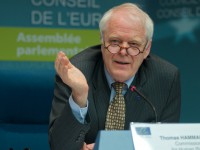CoE Paper on Post-War Justice in the Former Yugoslavia

“Inter-ethnic reconciliation, social cohesion
and durable peace in the region of the former Yugoslavia cannot be
achieved without the states fully addressing the consequences of the
serious human rights violations suffered by thousands of victims during
the wars in the 1990s. The remaining challenges require wise vision and
determined political leadership. Peace and stability in the region
should be firmly grounded in the principles of human rights and the rule
of law” said Thomas Hammarberg, the Council of Europe Commissioner for
Human Rights, presenting in Sarajevo a
Paper on Post-War Justice in the Former Yugoslavia.
The paper analyses and sets out recommendations on four major components
of post-war justice: measures for the elimination of impunity; the
provision of adequate and effective reparation to all war victims; the
need to establish and recognise the truth concerning gross human rights
violations; and institutional reforms to effectively prevent repetition
of past events.
“Despite efforts and progress achieved, the legacy of the violent recent
past still dangerously lingers across the region of the former
Yugoslavia” said the Commissioner. “Impunity for wartime crimes has not
been eliminated, and there are still some 13 500 missing persons whose
fates have not yet been clarified. Thousands of women who have suffered
sexual violence remain without adequate assistance. There are also
approximately 438 000 refugees and other displaced persons whose
legitimate claims for reparation have not yet been met. In addition, the
situation of about 18 000 persons in the region who are stateless or at
risk of statelessness, especially Roma, poses serious human rights and
humanitarian concerns that need to be addressed and solved in compliance
with agreed European and international standards”.
The Commissioner stresses the fundamental importance of establishing
efficient national judicial systems in the region’s countries in order
not only to reinforce the rule of law, but also to increase the
necessary public trust in the judiciary and strengthen the prevention of
human rights violations.
Fair and durable solutions should be agreed upon by states to end the
protracted displacement of refugees and other displaced persons. Women
who have suffered wartime sexual violence remain in a particularly
vulnerable position and deserve stronger support by the states
concerned.
Public acknowledgment of the facts and acceptance of responsibility can
be an important form of satisfaction that contributes to the reparation
of the serious harm suffered by war victims. The Commissioner welcomes
the steps taken so far, not least by the Croatian and Serbian
Presidents, to recognise wartime crimes and the need to establish and
recognise the truth. “Recognition of past atrocities by state officials
leads to changes in people’s attitudes and helps reconciliation. Public
awareness-raising campaigns are also necessary to establish durable
peace and social cohesion in the region”.
The Commissioner expresses his support to the efforts made so far to
establish and recognise the truth for the human rights and international
humanitarian law violations that occurred during the wars in the former
Yugoslavia, and calls for more determined political engagement in this
field. “Efforts have been seriously hampered by persistent ethnic
polarisation and divisions among politicians and populations. The
region’s states should support the establishment of a regional truth and
reconciliation commission and provide it with the necessary human and
financial resources to operate effectively”.
Lastly, the Commissioner recommends an overhaul of the educational
systems of the states in the region so that they promote genuine
knowledge of history and tolerance and trust between the peoples,
especially the younger generation, and counter ethnic polarisation and
discrimination.
Further reading:
Commissioner’s thematic webpage on post-war justice in the region of
former Yugoslavia
Izvješće Vijeće Europe o poslijeratnoj pravdi u bivšoj Jugoslaviji




